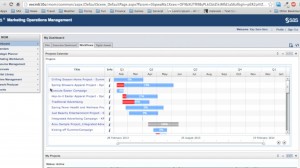If you are reading this and you are doing so because the #DigitalMarketing got your attention, then I’ve succeeded! The ‘term’ digital marketing is trending, showing up in white papers, blogs, and other social media, so it was a natural to use the term in the title.
Digital marketing is changing the way marketers reach and interact with their customers. As a result, marketers need to know how to execute across all of these new channels while continuing engagements on traditional channels. As these digital channels generate valuable data, marketers also need to figure out how to harness that data to inform better customer interactions. But as I read more and more about digital this, and #digital that, I can’t help but think that many marketers are missing the bigger picture. As digital marketing continues to introduce complexity (and opportunity) into marketing departments, now, more than ever, marketers need a foundation to help them manage the operational side of marketing to coordinate the end result: the message.
As digital channel proliferation continues, marketers must adapt their planning and execution strategies to include these valuable new data sources. At the same time, they cannot ignore more traditional channels such as media and print. To help them execute across all of these channels, marketers need solutions that help them automate their execution efforts, allowing them to effectively reach their consumers.

With these new digital channels and the potential of their data streams comes the temptation to overlook the need for a means to integrate marketing operations management into a broader integrated marketing management ecosystem. My goal is to highlight the risk that comes by making that oversight, and to point out a better way to address the issue.
Using a marketing operations management solution offers great benefits in terms of organizational function and also as the foundational element to an integrated marketing management (IMM) framework.
The application of an IMM framework helps organizations better execute a “closed loop marketing” process which uses data from your customer interactions and feedback to refine future marketing messages and customer interactions. While this might seem simple, many marketing departments are experiencing a hiccup in the process, inhibiting their ability to deliver the right message at the right time, while remaining on budget.
Providing consumers with a consistent brand message, managing budgets and expenses, and wrangling the new processes associated with new and traditional channels is not an easy feat! For some marketers, it’s all they can do just to keep up, especially considering impacts such as budget changes, rush jobs, and other priorities. For all of these reasons, marketers need something to help them manage the operational side of things. No, it's not necessarily glamorous, but keeping the works behind the scenes humming smoothly enables the more glamorous side of marketing. Delivering a brand message across channels to reach customers in a timelier, cost-effective, and message-consistent manner becomes a more attainable goal.
I have seen some planning and execution efforts coordinated with pretty fantastic folder structures (in SharePoint) and Excel documents. It’s always impressive - but it’s decidedly not efficient. Some of the typical inefficiencies we see organizations dealing with on a daily basis include:
• Sending updates and getting approvals via email or sticky notes,
• Managing processes and timelines within Excel documents,
• Storing all planning and execution supporting documents and data in SharePoint sites or personal computers
• Recreating assets because they can’t be located for reuse.
That short summary calls out just a few of the inefficiencies that can be solved by leveraging a marketing operations management solution. Considering how marketers need to focus on communicating a consistent brand message to consumers, it’s counterproductive to have to focus on whether sticky notes fell off of a document between one reviewer and the next. Efficient operations are important to successful campaign executions because that enables marketers to execute more campaigns that are more meaningful. Especially with digital channel proliferation, establishing a foundation to support these operations is no longer a nice to have, it’s a must.
There is little doubt that digital marketing will continue to transform how marketing departments function. And the need to establish your foundation through strategic planning and execution efforts, in a central system of record, will remain true. As one of my coworkers likes to say, "With flying cars, you still need rules of the road…" In that regard, the best way to think of a robust marketing operations management solution is as a great set of dynamic rules of the road.
Want to learn more? Let us know. Thank you for following!
